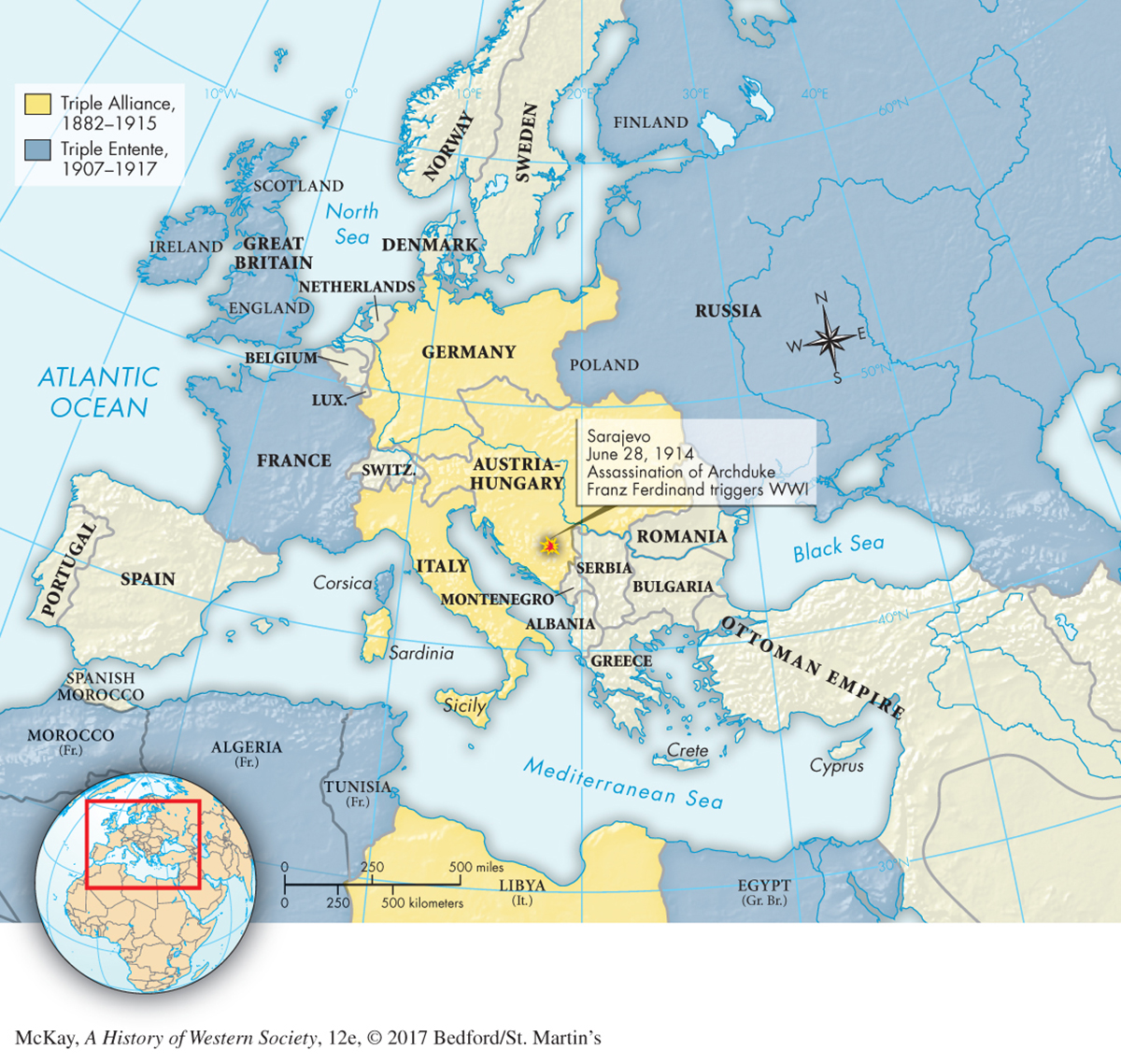A History of Western Society: Printed Page 828
A History of Western Society, Value Edition: Printed Page 796
A History of Western Society, Concise Edition: Printed Page 828
Chapter Chronology
Growing International Conflict
The First World War began, in part, because European statesmen failed to resolve the diplomatic problems created by Germany’s rise to Great Power status. The Franco-Prussian War and the unification of Germany opened a new era in international relations. By the war’s end in 1871, France was defeated, and Bismarck had made Prussia-Germany the most powerful nation in Europe (see Chapter 23). After 1871 Bismarck declared that Germany was a “satisfied” power. Within Europe, he stated, Germany had no territorial ambitions and wanted only peace.
Page 829
But how was peace to be preserved? Bismarck’s first concern was to keep France — bitter over its defeat and the loss of Alsace and Lorraine — diplomatically isolated and without allies. His second concern was the threat to peace posed by the enormous multinational empires of Austria-Hungary and Russia, particularly in southeastern Europe, where the waning strength of the Ottoman Empire had created a threatening power vacuum in the disputed border territories of the Balkans.
Bismarck’s accomplishments in foreign policy were effective, but only temporary. From 1871 to the late 1880s, he maintained German leadership in international affairs, and he signed a series of defensive alliances with Austria-Hungary and Russia designed to isolate France. Yet in 1890 the new emperor Wilhelm II incautiously dismissed Bismarck, in part because he disagreed with the chancellor’s friendly policy toward Russia. Under Wilhelm II, Bismarck’s carefully planned alliance system began to unravel. Germany refused to renew a nonaggression pact with Russia, the centerpiece of Bismarck’s system, in spite of Russian willingness to do so. This fateful move prompted long-isolated republican France to court absolutist Russia, offering loans, arms, and diplomatic support. In early 1894 France and Russia became military allies. As a result, continental Europe was divided into two rival blocs. The Triple Alliance of Austria, Germany, and Italy faced an increasingly hostile Dual Alliance of Russia and France, and the German general staff began secret preparations for a war on two fronts (Map 25.1).

Figure 25.1: MAP 25.1 European Alliances at the Outbreak of World War I, 1914 At the start of World War I, Europe was divided into two hostile alliances: the Triple Entente of Britain, France, and Russia, and the Triple Alliance of Germany, Austria-Hungary, and Italy. Italy never fought with the Triple Alliance but instead joined the Entente in 1915.
As rivalries deepened on the continent, Great Britain’s foreign policy became increasingly crucial. After 1891 Britain was the only uncommitted Great Power. Many Germans and some Britons felt that the advanced, racially related Germanic and Anglo-Saxon peoples were natural allies. However, the good relations that had prevailed between Prussia and Great Britain since the mid-eighteenth century gave way to a bitter Anglo-German rivalry.
There were several reasons for this ill-fated development. Commercial rivalry in world markets between Germany and Great Britain increased sharply in the 1890s, as Germany became a great industrial power. Germany’s ambitious pursuit of colonies further threatened British interests. Above all, Germany’s decision in 1900 to expand significantly its battle fleet posed a challenge to Britain’s long-standing naval supremacy. In response to German expansion, British leaders prudently shored up their exposed global position with alliances and agreements. Britain improved its often-strained relations with the United States, concluded an alliance with Japan in 1902, and allied with France in the Anglo-French Entente of 1904, which settled all outstanding colonial disputes between Britain and France.
Alarmed by Britain’s closer ties to France, Germany’s leaders decided to test the strength of their alliance. In 1905 Wilhelm II declared that Morocco — where France had colonial interests — was an independent, sovereign state and demanded that Germany receive the same trading rights as France. Wilhelm II insisted on an international conference in hopes that his saber rattling would settle the Moroccan question to Germany’s benefit. But his crude bullying only brought France and Britain closer together, and Germany left the conference empty-handed.
Page 830
The result of the First Moroccan Crisis in 1905 was something of a diplomatic revolution. Britain, France, Russia, and even the United States began to see Germany as a potential threat. At the same time, German leaders began to see sinister plots to encircle Germany and block its development as a world power. In 1907 Russia, battered by its disastrous war with Japan and the revolution of 1905, agreed to settle its quarrels with Great Britain in Persia and Central Asia and signed the Anglo-Russian Agreement. This agreement laid the foundation of the Triple Entente (ahn-TAHNT), an alliance between Britain, Russia, and France.
Germany’s decision to expand its navy with a large, enormously expensive fleet of big-gun battleships, known as “dreadnoughts” because of their great size and power, heightened international tensions. German patriots saw a large navy as the legitimate right of a great world power and as a source of national pride. But British leaders saw the German buildup as a military challenge that forced them to spend the “People’s Budget” (see Chapter 23) on battleships rather than social welfare. In 1909 the London Daily Mail hysterically informed its readers that “Germany is deliberately preparing to destroy the British Empire.”1 By then Britain had sided psychologically, if not officially, with France and Russia.
The leading nations of Europe were divided into two hostile camps, both ill-prepared to deal with the worsening situation in the Balkans. Britain, France, and Russia — the Triple Entente — were in direct opposition to the German-led Triple Alliance (see Map 25.1). This unfortunate treaty system only confirmed the failure of all European leaders to incorporate Bismarck’s mighty empire permanently and peacefully into the international system. By 1914 many believed that war was inevitable.
